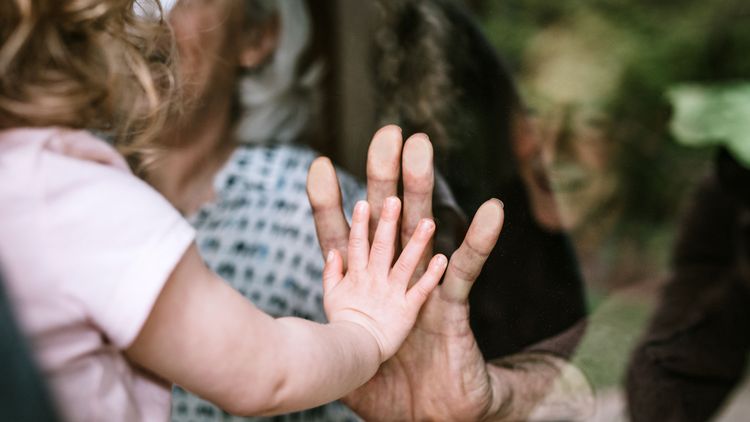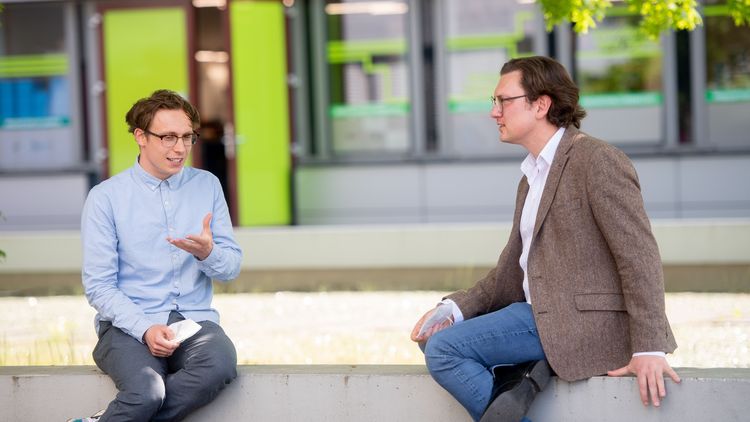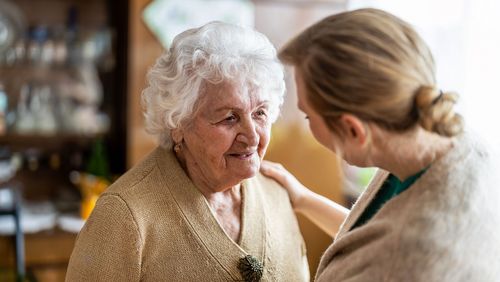Solidarity and social responsibility between generations in the pandemic constitute a focus of their research. Mark Schweda and Niklas Ellerich-Groppe discuss common goals of the young and the elderly, constructive changes of perspective – and where solidarity reaches its limits.
Who should be vaccinated, who should get which vaccine, and who can look forward to regaining lost freedoms – how do you see the current debate from a medical ethics perspective?
Mark Schweda: It is weighed down by the pressure of more than a year of pandemic. This has been a difficult and stressful period for us all – but the different sections of the population have faced very different challenges. As a result, the debate about access to the vaccine and the consequences of vaccination is now becoming highly emotional. The main challenge here is to reach a consensus on the legitimacy of our respective interests without turning on each other. Even if it's exhausting, we must continue to focus on the big picture: What are our goals as a society? How can we best achieve them? And who can and must make what contributions in the process? Otherwise, resentment will grow and social cohesion will suffer.
What do you understand by solidarity?
Niklas Ellerich-Groppe: It is likely that no other ethical term has been used as often as this one in recent months. Yet at the same time our understanding of it seems very limited. We generally associate solidarity with the idea of supporting each other. In a narrower sense, solidarity can be defined as the willingness to contribute towards achieving a certain goal for others or together with others. The goal is usually perceived as a morally justified goal, and contributing towards it can certainly entail sacrifices. The question is always: Who is willing to make what contributions for whom or with whom, and to what end?
Is there a strong sense of solidarity in our society?
Schweda: The coronavirus crisis is a kind of litmus test for this. We aspire to be a society in which not everyone thinks only of themselves and no one is simply left in the lurch. And particularly at the start of the pandemic, large sections of the population demonstrated a great sense of solidarity that took different forms – special consideration for particularly vulnerable groups, the enormous commitment of entire professional groups such as medical and nursing staff, and widespread compliance with contact restrictions. Many were surprised by the degree of social cohesion that became apparent.
Has this changed in the meantime?
Schweda: Certain centrifugal forces appear to be gaining momentum. The restrictions are starting to take their toll. Many are beginning to question to what extent individual measures are really justified. This is perfectly understandable and even necessary in a modern, pluralistic society. People's circumstances vary greatly, and balancing interests can be extremely complicated. Solidarity cannot be the result of uniform group pressure, but only of a unity in diversity that must be constantly renegotiated. At the same time, there is a lot of polarizing in politics and the media, false enemies are being created, and groups are being played off against each other. We must defend ourselves against this.
What are your views on the question of intergenerational solidarity? What challenges does this pose?
Ellerich-Groppe: The young and the elderly are facing very different challenges in the coronavirus pandemic, and their perspectives differ accordingly. This makes it harder to identify common ground that can serve as a basis for solidarity. It is not always clear to whom we are referring when we talk about "the generations"; these are often very loosely defined groups: Who are "the elderly"? Who are "the young"? On both sides, very vague ideas are often in play.
You are examining this debate in a new research project on solidarity and social responsibility. To what extent do the young and the old have a choice here?
Schweda: The idea of intergenerational solidarity has been invoked again and again in recent times. This began with political measures some of which placed severe restrictions on private and public life in a bid to contain the pandemic. Protecting the elderly, who are considered particularly vulnerable, often served as justification for these measures – and similar arguments were used when it came to deciding in which order people would be vaccinated. But nobody asked the elderly whether or to what extent they wanted this protection.
So you're saying that they were passed over in the decision-making.
Schweda: Yes. And conversely, there have been repeated demands for the elderly to take a back seat or even sacrifice themselves for the sake of the younger generations. The mayor of Tübingen, Boris Palmer, said that thanks to infection control measures people who would soon be dead anyway were being saved at great expense. Proposals to prioritize access to life-saving ventilation units according to age have repeatedly circulated in the triage debate. And the debate continues. This is why in our research project we consider it important to first review the various moral claims put forward in the name of intergenerational solidarity and understand them in greater detail. Then we can conduct a proper discourse on how justified they are.
And from an ethical viewpoint: Where does solidarity reach its limits, or are there no limits?
Ellerich-Groppe: Solidarity is not something I can force on people. I can campaign for it, I can appeal to people's sense of solidarity, I can even demand it. But where it doesn't exist, I can't simply impose it. This means that there are practical limits to solidarity. For example, I can't show solidarity with everyone equally; I have to somehow feel connected to the people in question, or there has to be some kind of sense of community. In this respect, solidarity always involves limits and, unfortunately, sometimes also exclusion and marginalization. In addition, we all have limited resources, which can also impose limits on solidarity. At some point, my practical possibilities to take on additional burdens out of solidarity with others may be exhausted. For example, many families with young children where parents have been juggling jobs and homeschooling for a year are saying that they can no longer cope and would now like to see the older generation show solidarity.
Are there other limits on solidarity?
Ellerich-Groppe: It is not only practicalities that impose limits on solidarity, but also different moral standards and values or legal principles. We have said that attitudes and acts of solidarity presuppose a good cause for the sake of which one is willing to assume certain burdens. If the cause does not or no longer seem worthwhile – or the burdens demanded are no longer deemed appropriate –, solidarity is called into question. Moreover, even more fundamental and weighty norms such as human rights or the principles of fairness are at play. For example, even as an old person I undoubtedly have the right to adequate healthcare. This is not just a matter of solidarity.
How should society deal with the costs arising from the pandemic from an ethical point of view? Can they be distributed equally in the spirit of solidarity, or will the burden – as with climate protection – fall mainly on the younger generations?
Schweda: This will be one of the key questions in the coming years. Against the backdrop of the climate crisis, calls have long been made for a new intergenerational contract. This extremely difficult debate must be conducted openly to avoid jeopardizing our social cohesion. It is important to ensure that everyone is involved, and to take future generations into account. This aspect was also underlined by the Federal Constitutional Court in its recent ruling on the climate protection law in Germany. Instead of intergenerational conflicts, we need to bear in mind all the things we have in common. It can be helpful to remember that even old people were once young, and that the young will – hopefully – one day grow old. We're all in the same boat!
Interview: Deike Stolz





